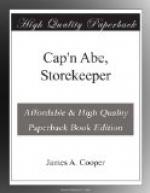“Louise, I wish to talk to you,” at last said Mrs. Conroth grimly.
“True,” sighed her niece. “And how extremely exact you always are in your use of the language, auntie. You never wish to talk with me. You will do all the talking as usual, I fear.”
“You are inclined to be saucy,” bruskly rejoined Aunt Euphemia. “As your father is away I feel more deeply my responsibility in this matter. You are a wayward girl—you always have been.”
“You don’t expect me to agree with you on that point, do you, auntie?” Louise asked sweetly.
Mrs. Conroth ignored the retort, continuing: “I am not amazed, after seeing your surroundings at the Silt place, that you should become familiar with these common longshore characters. But this that I have just learned—only this forenoon in fact—astonishes me beyond measure; it does, indeed!”
“Let me be astonished, too, auntie. I love a surprise,” drawled her niece.
“Where were you yesterday?” demanded Aunt Euphemia sharply.
Louise at once thought she knew what was coming. She smiled as she replied: “Out fishing.”
“And with whom, may I ask?”
“With Betty Gallup, Uncle Abram’s housekeeper.”
“But the man?”
“Oh! Mr. Tapp, you mean? A very pleasant young man, auntie.”
“That is what I was told, Louise,” her aunt said mournfully. “With young Tapp. And you have been seen with him frequently. It is being remarked by the whole colony. Of course, you can mean nothing by this intimacy. It arises from your thoughtlessness, I presume. You must understand that he is not—er——Well, the Tapps are not of our set, Louise.”
“My goodness, no!” laughed the girl cheerfully. “The Tapps are real Cape Codders, I believe.”
Aunt Euphemia raised her eyebrows and her lorgnette together. “I do not understand you, I fear. What the Tapps are by blood, I do not know. But they are not in society at all—not at all!”
“Not in society?” repeated Louise, puzzled indeed.
“Scarcely. Of course, as Mrs. Perriton says, the way the cottagers are situated here at The Beaches, the Tapps must be treated with a certain friendliness. That quite impossible ‘I. Tapp,’ as he advertises himself, owns all the Point and might easily make it very disagreeable for the rest of the colony if he so chose.”
She stopped because of the expression on her niece’s countenance.
“What do you mean?” Louise asked. “Who—who are these Tapps?”
“My dear child! Didn’t you know? Was I blaming you for a fault of which you were not intentionally guilty? See how wrong you are to go unwarned and unaccompanied to strange places and into strange company. I thought you were merely having a mild flirtation with that young man in the full light of understanding.”
Louise controlled her voice and her countenance with an effort. “Tell me, Aunt Euphemia,” she repeated, “just who Lawford Tapp is?”




